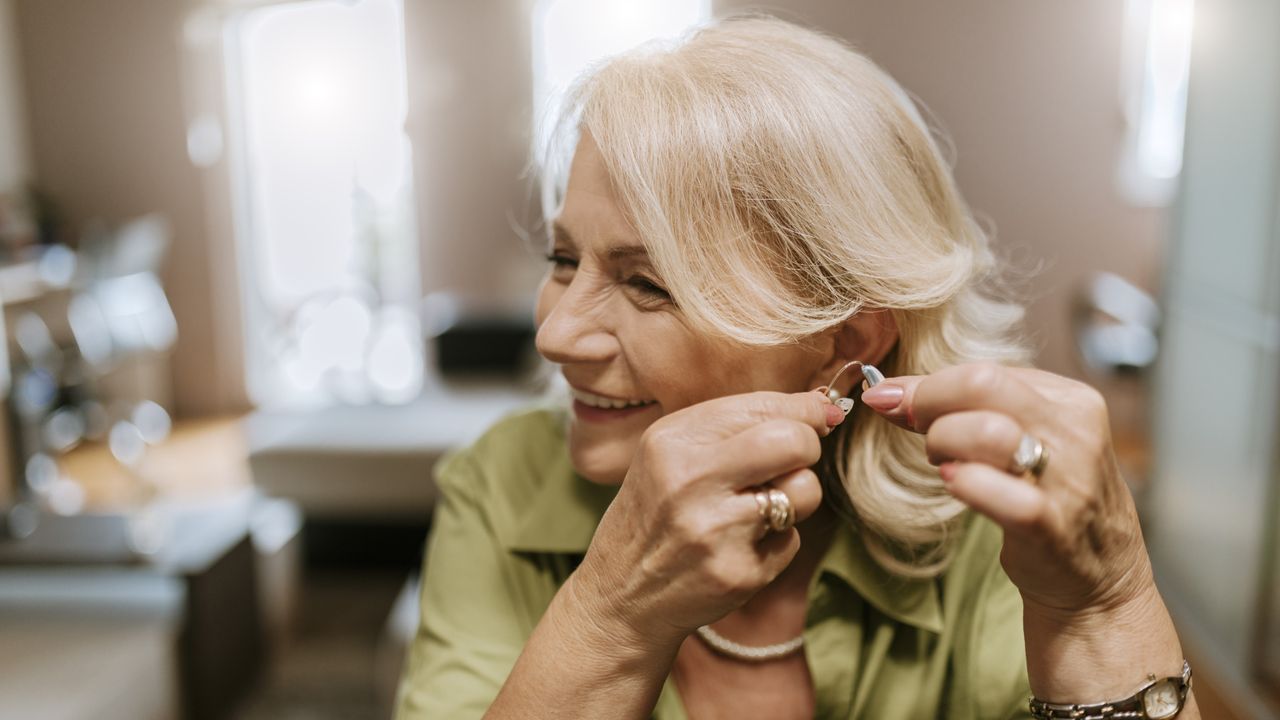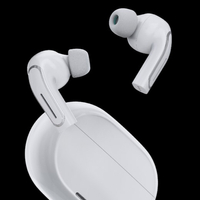How hearing loss can affect your mental health - and what you can do to protect it
Four ways to look after your wellbeing when experiencing hearing loss


Hearing loss is about more than losing some level of hearing. It can also impact your day-to-day life, affecting your mental health and wellbeing. If you notice your hearing loss is having a negative effect on your mental health, it’s important to speak up and get professional help, to treat both the root cause of your hearing loss and to protect your mental health.
Hearing loss can be incredibly frustrating and isolating, leading those who suffer to retreat from their usual day-to-day activities because of the distress the loss causes for them.
"Many people don’t realize this, but the loss of hearing represents more than just difficulty hearing sounds, struggling to hear can make communication very challenging," says Owen Song, CEO & Founder of Olive Union.
Dr. Dan Bunstone, NHS GP and Chief Medical Officer at Push Doctor, adds that this challenge can create strain in almost all aspects of life.
This strain could cause you to struggle to keep up with conversations at work, home or with friends, or withdraw from hobbies such as sport, music and theatre.
“This can cause people to feel frustrated, isolated, and lonely, potentially leading to depression or other mental health problems,” adds Dr. Bunstone.
But, all hope is not lost. Acknowledging your hearing loss and how it’s affecting your wellbeing is the first step to getting help, and on the journey to leading a happy and sociable life. Here’s how to look after your hearing loss and your mental health.
Sign up for the woman&home newsletter
Sign up to our free daily email for the latest royal and entertainment news, interesting opinion, expert advice on styling and beauty trends, and no-nonsense guides to the health and wellness questions you want answered.
Olive Pro: 2-in-1 Hearing Aids & Bluetooth Earbuds
Currently available to pre-order, the Olive Pro hearing aids and Bluetooth earbuds are said to create brilliant speech understanding, automated background noise cancellation and crisp sound quality for better music listening.
1. Open up to your loved ones
Hearing loss can be isolating, says Dr. Martin Edwards of UCL. It can cause people to retreat from conversations because they can't follow along or feel like they can't engage.
This is why it’s so important to open up to your loved ones about your experience. Explaining your hearing loss, how it affects your day-to-day life, and how you feel about it, will make it easier for those around you to understand when you might struggle to hear and what they can do to make things easier for you.
Dr. Edwards says this could be as simple as asking friends to sit across from you in a cafe instead of beside you, so you can see their face, and lip-read to help you follow along with the conversation.
While sometimes, the idea of opening up to those closest to you about hearing loss may feel like it's easier said than done, you should remember that losing any level of hearing is nothing to be embarrassed about, and sharing your feelings with your loved ones will benefit both of you. It will help you feel less isolated and allow them to understand why you may sometimes ask them to repeat things they've said or turn the TV up a little louder.
2. Seek treatment for your hearing loss
According to the WHO, over 5% of the world’s population needs treatment for their hearing loss. If you’re feeling down about your hearing loss and how it’s affecting your daily life, it’s important you seek treatment for both your hearing loss and your wellbeing.
According to Dr. Edwards, treatments for hearing loss vary depending on the level of loss. For some, treatment could be as easy as removing built-up ear wax. For more advanced loss, a hearing aid could be beneficial. But, long gone are the days of chunky hearing aids, today’s modern versions are slim, stylish and subtle.
Depending on your level of hearing loss, you can pop modern hearing aids in and out as you need them. Just like glasses you might wear for reading or watching TV.
For example, the Olive Pro: 2-in-1 Hearing Aids & Bluetooth Earbuds by Olive Union were created with this idea in mind. The 2-in-1 hearing aid and earbuds can be connected to your smartphone and have a hearing mode that can be used to cancel background noise and aid speech understanding, while the music mode allows you to listen to your favorite tunes. The earbud-style of this hearing aid means they look just like headphones and are a stylish alternative to a traditional hearing aid.
If you experience hearing loss, you should contact your doctor for further advice. If you experience sudden hearing loss, loss in one ear or ringing in one or both ears, you should seek medical attention as soon as possible to determine the root cause.
3. Speak with your doctor
As well as speaking with your loved ones about how your hearing loss is affecting your mental health, Dr. Bunstone advises getting in contact with a healthcare professional if your low mood persists or you feel you're struggling to cope.
“Your doctor will be able to discuss other treatment to help you improve your mental health, such as therapy, and work with you to help you achieve a greater quality of life.”
There are a number of therapies out there, from talking therapy to CBT, which can help you manage your feelings toward your hearing loss and provide you with coping strategies and techniques to put into practice if you're feeling sad, frustrated or isolated.
Therapy can also be helpful if you're struggling to speak to your loved ones about your hearing loss, as it's a safe space to share your feelings and concerns.
4. Try mindfulness
The idea of mindfulness is to focus on the present moment, without judgment. Mindfulness meditations can help you relax in frustrating moments when your hearing loss is impacting your day, but can also help you accept your hearing loss without judgment, says Dr. Edwards. Practicing mindfulness regularly will help you see the things you cannot change and accept them for what they are.
In moments of distress, try the square breathing meditation technique. You can do it with your eyes open or closed, seated or standing. Begin by breathing in for a count of four, holding for a count of four, breathing out for a count for four and holding for a count of four. Repeat the sequence a few times to help you relax and feel calm in difficult situations.
If you are concerned about your hearing loss, experience sudden hearing loss in one or both ears, experience ringing in one or both ears or feel your hearing loss is negatively impacting your daily life, contact your doctor or audiologist for further medical advice.
Ciara McGinley is a meditation practitioner and health journalist. She qualified as a meditation teacher with the British School of Meditation in 2020 and is the founder of Finding Quiet, a series of classes, workshops and retreats that combine meditation practices and mindfulness techniques to make mindful living realistic in an always-switched-on modern world. She is all about bettering that mind-body connection but believes wellness looks different to everyone.
Ciara is also the former Health Channel Editor at woman&home and has covered all things health and wellbeing for years, from fitness to sleep to relationships.
-
 The rise of grey divorce: 'It was hell after 40 years of marriage - but now I'm loving life'
The rise of grey divorce: 'It was hell after 40 years of marriage - but now I'm loving life'‘Grey divorce’ is on the rise, but experts say there's no reason why you can't start again later in life
By Kerry Law Published
-
 Household items you should clean more regularly
Household items you should clean more regularlyThink you're cleaning enough? Think again! Everyday items harbour hidden bacteria, some worse than a toilet seat, here’s what you’re missing…
By Natalie Denton Published


